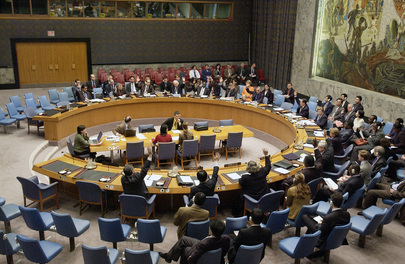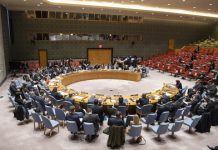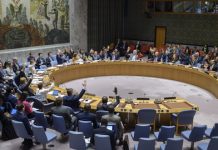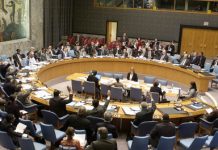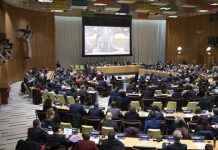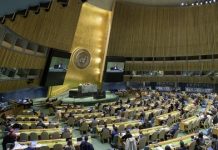[TEASER CLIPS]
This is The Lid Is On, I’m Conor Lennon
We’re coming up to the halfway point of COP29, the UN Climate Conference, which is taking place at the Olympic Stadium in Baku, the capital of Azerbaijan.
As ever, it’s been an extremely busy affair, with hundreds of side events, and negotiators from the nations of the world cloistered away, trying to iron out their differences and take a decisive step forward in addressing the climate crisis.
The urgency is undeniable: a UN climate report released just days before the Conference confirmed that the global average temperature rise is already approaching 1.5°C above pre-industrial levels.
Without drastic action to cut greenhouse gas emissions, we could be on course for a catastrophic rise of up to 3.1 degrees this century.
On this episode, we’re going to focus on what has been achieved so far at COP29, so you can tell all your friends that you understand what Article 6 means,
We will look at some of the reactions to the return to power of a US administration that, last time it was in office, pulled out of the Paris Climate Agreement.
And we will also find out why we should all be getting excited about…minerals. Trust me, we should.
This year’s COP is being called the “climate finance COP”, because delegates are expected to sign off on a beefed-up funding target to replace the existing $100 billion per year commitment. The final figure the negotiators arrive at remains to be seen and it could be anywhere from a few hundred billion, to over a trillion dollars per year.
Right from the off, the tone was set by Simon Stiell, the head of UN climate change, as he addressed delegates on Monday.
Simon Stiell: “We must agree a new global climate finance goal. If at least two thirds of the world’s nations cannot afford to cut emissions quickly, then every nation pays a brutal price. If nations can’t build resilience into supply chains, the entire global economy will be brought to its knees. No country is immune.”
“So, let’s dispense with the idea that climate finance is charity. An ambitious new climate finance goal is entirely in the self-interest of every single nation, including the largest and wealthiest. We mustn’t let 1.5 slip out of reach. And even as temperatures rise, the implementation of our agreements must claw them back. Clean energy and infrastructure investment will reach two trillion dollars in 2024. Almost twice that of fossil fuels. The shift to clean energy and climate-resilience will not be stopped. Our job is to accelerate this and make sure its huge benefits are shared by all countries and all people.”
Simon Stiell, the head of UN Climate Change agency, speaking on the first day of COP29.
So-called “frontline states,” the countries bearing the brunt of the crisis, were out in force this week, both in the negotiations, and in front of the media, to ram home the message that real action must be taken on the finance question.
The Republic of the Marshall Islands, in the Pacific, is one of these frontline states, deemed extremely vulnerable to climate change, particularly rising sea levels. The country founded the High Ambition Coalition, a group of developing and developed economies pushing for strong climate measures.
On Wednesday, Hilda Heine, the President of the Marshall Islands, told journalists that the members of the coalition are pushing for a “race to the top” and redoubling their commitment to global solidarity.
Hilda Heine: We agree that trillions of dollars are required, and that we must urgently increase the amount of financing for climate action.
We must also accelerate the transformation of the international financial architecture and address long-standing inequities. Addressing debt and the high cost of capital is also key. We have all committed to slashing emissions sharply in this decade through a just transition that leaves no one behind.
We must deliver on the energy commitments made in Dubai, and tackle the trillions in subsidies that support fossil fuels. We know that adaptation saves lives, and that all countries must take forward adaptation efforts and have the means to do so.
Finally, our members agree that women and girls are disproportionately affected and must be at the heart of solutions, and that all voices must be heard and respected. We will keep striving for ambition together.
Hilda Heine, the President of the Marshall Islands, speaking at a press conference calling for greater climate ambition and finance.
And no, the journalists there did not ignore the elephant in the room: the uncertainty introduced by the outcome of the election in the United States, currently the second biggest emitter of carbon emissions worldwide, after China, and historically the number one emitter.
The incoming administration’s climate stance has raised questions in the climate community, given the fact that, the last time they were in power, they removed the US from the Paris Climate Agreement, which, whilst it may have its share of detractors over the targets set and the speed it’s delivering change, underpins the entire process.
However, there has also been a noticeable “Keep Calm and Carry On” tone from many of the participants.
President Heine and Eamon Ryan, the Environment Minister of Ireland – one of the developed countries in the High Ambition Coalition – had this to say.
Hilda Heine: For the Marshall Islands, the climate crisis is the most pressing security threat we face. I will communicate with President-elect Trump about the importance to our shared security as they have bases in the Marshall Islands of taking the climate crisis seriously. We don’t think that the election result will necessarily put a stop to the process that is underway. In the United States, states and cities are already actively moving this process forward. It might be different at the federal level with the new president, but I think already policies are being implemented that are in place to move this work forward.
Eamon Ryan: I don’t believe any country, be it the United States or others, in a sense can put a veto, a block, on what we do need to do to make progress. Nor can what we agreed last year be a menu just to, I’ll take this bit but not another.
And I think one of the reasons why that’s the case is because we are moving to a better system, a better economy. It has to be. It’ll only work if it’s a better system, including the financing system, which currently is fundamentally unjust. It leaves out large sections of the world and it doesn’t provide reliable finance for what we need to do. So whatever one country does, Paris Agreement still lives. It’s still strong. It’s actually delivering for countries because it is the way forward to a better economy.
President Hilda Heine of the Marshall Islands, and Eamon Ryan, the Environment Minister of Ireland.
Although we’ll have to wait for the end of COP before the final climate finance agreement, a deal was announced on Monday, with delegates adopting an agreement seen as critical to the launch of a UN-backed global carbon market. This market would be a cornerstone of funding for projects that lead to cuts in greenhouse gas emissions.
This is the famous (in climate circles at any rate) Article 6 of the 2015 Paris Climate Agreement which, it is hoped, would provide countries with an added incentive to work together to lower the world’s overall carbon footprint.
Our correspondent Nazrin Babayeva caught up with James Grabert from UN Climate Change, who explained why article 6, and this agreement, are so important.
James Grabert: It basically establishes a trading system where if there are emissions reductions that are done in a certain way and properly certified, countries can trade these credits that are created by these reductions in greenhouse gas emissions. That’s important because it will assist countries in meeting their targets. Around, let’s say, two-thirds or more countries have indicated that they intend to use Article 6 as part of the toolbox for meeting their targets. It makes it more feasible. And working with markets means it also gives those countries that are implementing these projects opportunities to engage the non-governmental sector, the private sector, and identifying what are the real economy opportunities, incentivizing that, et cetera.
Can we consider the COP29 a historic milestone due to the progress made on this issue?
I would say yes. This is a historical moment to say everything is in place to be able to say this is operational now. So that was important the first day to already give the go-ahead on some of these standards that allow us to be able to assess things in a consistent way and ensure the integrity that I was referring to. So we launch it here, it’s operational, but it’s something that will continuously be improved upon going forward. I think, in general, it gives a signal that we need climate action, but we need climate action that puts people first, and that we do it in a sustainable way, that we do it in an inclusive way, that we need to address climate change, but we can’t forget about sustainable development and about the needs of all the humans in the world.
James Grabert, the head of the Mitigation Division at UN Climate Change, speaking to our correspondent Nazrin Babayeva.
UN Secretary-General António Guterres was in Baku for the first few days of the conference, along with other members of the UN’s top brass.
He spoke at several meetings including the opening of the World Leaders Climate Action Summit, which is when heads of state and senior politicians get to say their piece, and tell us about the efforts they are taking to lower their carbon footprint, and issue calls for change.
As usual, the SG didn’t pull his punches.
António Guterres:This is a story of avoidable injustice. The rich cause the problem, the poor pay the highest price. Oxfam finds the richest billionaires emit more carbon in an hour and a half than the average person does in a lifetime. Now, unless emissions plummet and adaptation soars, every economy will face far greater fury.
Last year – and for the first time – the amount invested in grids and renewables overtook the amount spent on fossil fuels. And almost everywhere, solar and wind are the cheapest sources of electricity. So doubling down on fossil fuels is absurd. The clean energy revolution is here. No group, no business, and no government can stop it.
But all countries must do their part. And the G20 must lead. They are the largest emitters, with the greatest capacities and responsibilities.
Climate finance is not charity, it’s an investment. Climate action is not optional, it’s an imperative. Both are indispensable: to a liveable world for all humanity. And a prosperous future for every nation on Earth. The clock is ticking. I count on you.
UN Secretary-General António Guterres earlier this week, imploring world leaders to “tear down the walls of climate finance.”
Before he left – for a jetlag-tastic trip to Brazil for the G20 meeting in Rio de Janeiro – on Thursday, Mr. Guterres meetings on several climate-related topics, and we have stories on all of them on the UN News website.
But I wanted to pick out one in particular, a meeting on…minerals.
But not just any minerals, we’re talking about the so-called critical minerals that the world will need far more of, in order to produce the things we will need in a world that is no longer powered by fossil fuels, from solar panels, and wind turbines to electric vehicles and battery storage.
We’re talking copper, lithium, nickel, cobalt and rare earth minerals with exotic-sounding names like xenotime and aeschynite. Demand is forecast to almost triple by 2030.
A lot of these minerals are found in Africa, which could, in theory, provide a major financial boost for the countries concerned.
But there are also fears that this surge in demand could lead to a new version of the so-called “resource curse,” in which the nations that are home to the natural resources crucial to powering the global economy don’t actually benefit from them.
Mr. Guterres spoke about the need to manage the demand without triggering a “stampede of greed” that exploits local communities and crushes the poor.
Nazrin spoke to Dario Liguti, the head of the Sustainable Energy Division at the UN Economic Commission for Europe, to find out more.
Dario Liguti: The technologies underpinning the clean energy transition, renewable energy technologies, need a set of minerals which is very different from the old technologies they use. They still use some of the minerals like copper and iron like, you know, like the old fossil fuel industries, but they most of them they need as well as to a whole new set.
We are very concerned that these new energy technologies will create issues that we are issue having in the to solve today. Today we’re solving the issues of using fossil fuels but as well the impact of digging out these fossil fuels, whether it’s coal or gas or oil has have done on the environment, have done on the people around that and we’re paying the consequences of that.
We don’t want that to happen with this new energy transition and therefore that’s what we got involved into. We’ve been involved always, to make sure that the energy transition to make sure that these new critical minerals are exploited in a sustainable way, particularly in emerging markets, in places where you know many emerging markets are rich in these minerals where there is in Africa and Central Asia as well in South America, et cetera. And so we want the communities that are the live on the land where these minerals are that they are participate to the wealth that this meaning, this meaningless, bring that their environment is protected as much as possible, that their lifestyles and they create an economic opportunity and development opportunity for them as well locally.
The UN’s Dario Liguti on the work that is being done to make sure that everyone benefits from the transition to a world that is no longer powered by fossil fuels. In April, the Secretary-General brought together a number of countries, NGOs and representatives of civil society to form a High-Level Panel on critical energy transition minerals, to ensure that ensure that the countries and communities with these resources are the ones to benefit the most.
Delegates and governments are already looking ahead to next year’s COP in Brazil, which is going to get a lot of attention, because countries are expected to turn up and announce significantly ramped up national climate plans and explain how they’re going to move their economies away from fossil fuels.
The deadline for submitting these commitments is February 2025, so some nations are already flagging their plans.
They explained why Brazil’s government launched a project with UNIDO, to support the country’s attempts to limit carbon emissions from the cement and steel sectors, which are highly polluting, but very important to the economy.
Rodrigo Rollemberg: Brazil is honored to receive the COP, it’s the first COP in the rainforest, so it’s very symbolic and there’s big expectations also in terms of financing and the developed countries should be committed to that and should be very bold announcements and it’s important that the whole world recognizes that if the rainforest is deforested, it’s bad for the whole world.
Ciyong Zou: In all we see the biggest emissions from industries. That’s why we need money to change the whole industry process by what firstly to address the energy supply. Basically the electricity needs to be mainly from renewables.
we need to also look into the process of manufacturing, to reduce the energy consumption, to minimize the consumption of this manufacturing consumption of energies. Industry has to be a solution for the global climate target, the biggest challenge is that the climate financing is not yet ready, so UNIDO is partner with financial mechanisms to make this financial mechanism available for this transformation.
Brazil’s green economy minister Rodrigo Rollemberg, and Ciyong Zou, from the UN agency for industrial development.
And finally, talking of the future and what comes next, the Secretary-General met with a group of leading youth activists on climate issues on Thursday.
After the discussion, our colleague Lara Palmisano caught a few words with some of them.
Zagy Berian: We have to provide youth maybe a small grant for realizing their, you know, concrete projects for their rural community. We want to get some fund to increase capacity building within our network.
Basmallah Rawash: We are not the ones that are supposed to carry the burden of mitigation. We are not the ones who have caused this, but we are the ones that will carry the burden of the biggest struggle at the moment. Please, we don’t have to beg for finance. This is duties to be paid.
Ferdison Valmond: Young people are not only the future: they are today. We are the champions for causes that often go unheard, especially in relation to climate crisis.
That was Zagy Berian, a Climate Advocate with the Youth Climate Justice Fund, Basmallah Rawash, a Climate Activist with Care About Climate, and Ferdison Valmond, a Youth Fellow with Race to Resilience.
We will back once COP29 is over, to report back on the outcome, and find out how much will be committed for climate financing.
As I mentioned, there are daily stories on all aspects of the conference on UN News, and I’ve put a link in the show notes.
I’m Conor Lennon, and you’ve been listening to The Lid Is On, the flagship podcast from UN News.
Source of original article: United Nations (news.un.org). Photo credit: UN. The content of this article does not necessarily reflect the views or opinion of Global Diaspora News (www.globaldiasporanews.com).
To submit your press release: (https://www.globaldiasporanews.com/pr).
To advertise on Global Diaspora News: (www.globaldiasporanews.com/ads).
Sign up to Global Diaspora News newsletter (https://www.globaldiasporanews.com/newsletter/) to start receiving updates and opportunities directly in your email inbox for free.


